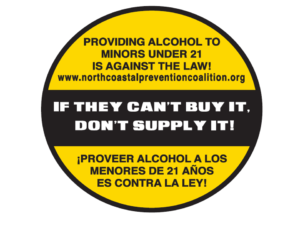Alcohol is the most abused drug by youth, and is associated with the leading causes of death for teens and young adults including motor-vehicle crashes, homicides, and suicides.
What’s the Problem?
- Underage drinking is associated with the leading causes of death for teens and young adults, including motor vehicle crashes, unintentional injuries, homicides, and suicides.
- Underage drinkers are up to four times more likely to develop alcohol dependence than those who wait until the legal drinking age of 21.
- Alcohol is the most abused drug by teens, with over 20% of 11th graders reporting drinking in the past month
- Youth and young adults under 21 who drink report obtaining alcohol at house parties and from family and friends as the most common way they get alcohol.
NCPC is one of six regional providers that works with the San Diego County Binge and Underage Drinking Initiative, community partners, and teens to change the community environment that promotes irresponsible alcohol use and abuse. Efforts focus on the following:
- Social Host Ordinances to reduce underage drinking at home parties by informing the public and increasing enforcement;
- Responsible Alcohol Sales and Service (RBSS) ordinances to require sellers and servers of alcohol to receive State-certified training to prevent alcohol sales to minors and sales to intoxicated patrons;
- Alcohol Outlet Density and Conditional Use Permit (CUP) processes to prevent an over-concentration of alcohol retail businesses;
- Alcohol advertising and marketing assessment and documentation in community settings and businesses to reduce alcohol advertising that appeals to young people.
Responsible Beverage Service and Sales (RBSS)
Cities across the State have adopted innovative policies to prevent and reduce alcohol-related problems. In California, collisions involving alcohol resulted in 1,155 deaths and nearly 24,000 serious injuries in 2014, according to San Diego police. In the past three years, San Diego police have investigated 2,381 DUI collisions, which claimed 19 lives and resulted in another 2,257 injuries.
Many of those drivers were drinking at businesses licensed to sell alcohol. While the State of California prohibits the sale or service of alcohol to minors or obviously intoxicated customers, the State Bill AB 1221, passed on September 11, 2017, requires bartenders to receive training that will help reduce the risk of drunk-driving crashes and alcohol related problems. The California Department of Alcoholic Beverage Control (ABC) offers a 3 ½ hour training program, Licensee Education on Alcohol and Drugs (LEAD), that is free of charge to participants. The training covers checking various forms of identification, detecting and preventing illegal activity, liability laws, preventing over-service of alcohol, and other ways to provide responsible alcohol-related sales and services.
Link to full coverage on AB 1221 Bill Requiring Drunk Driving Prevention Training for Bartenders
Changing Serving Practices:
An alcohol-licensed business was the most frequent type of location named as the place of last drink prior to arrest for DUI. Changing the serving practices of bartenders and wait staff has the potential for reducing drinking and driving incidents.
Participant feedback from ABC LEAD trainings found that:
The majority of respondents indicated that the training modified their perceptions about the roles they can play in responsible sales and service of alcohol. Regardless of employment status or establishment type, nearly all respondents also said they would change various aspects of the way they performed their jobs in order to protect themselves, their jobs, their patrons, and the larger community.
For information about North County ABC LEAD trainings on the City of Vista website, click HERE!
For class registration information, click HERE!
Additional Information and Presentations:
- Preventing Underage Drinking (English)
- Preventing Underage Drinking (Spanish)
- CADCA Forum 2014– Prevent Alcohol Advertising on Public Property
- Oklahoma Prevention and Recovery Conference 2017- Advocating for Local Alcohol Policies

